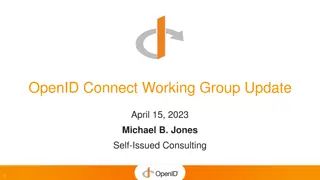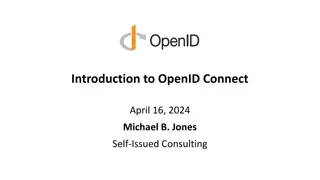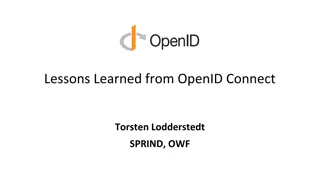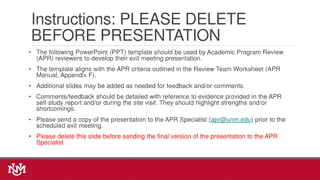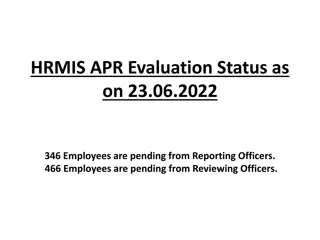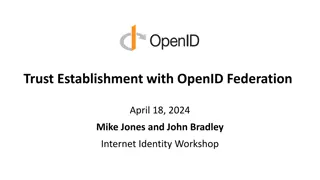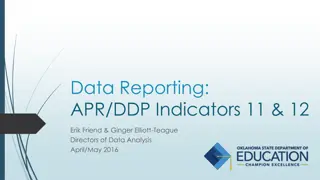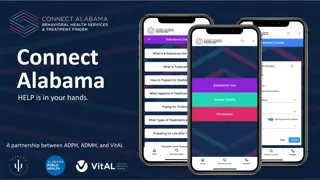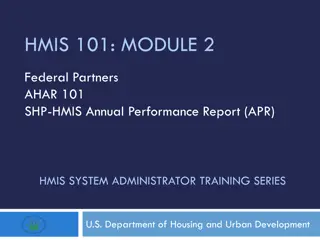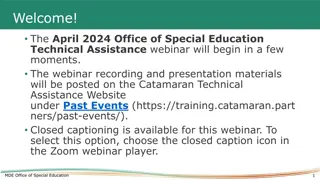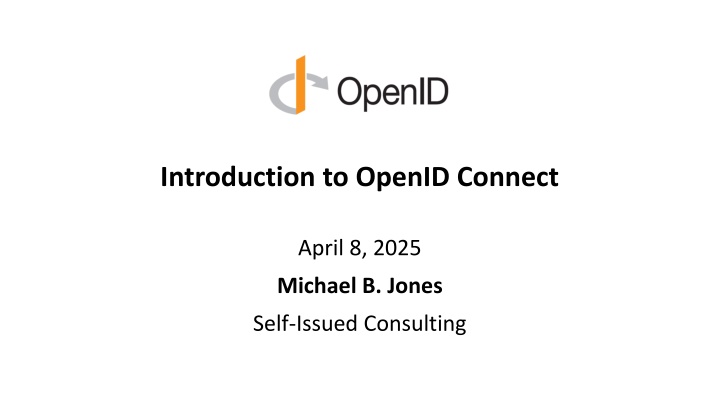
Understanding OpenID Connect: A Comprehensive Overview
Gain insights into OpenID Connect, a vital identity layer built on OAuth 2.0. Explore its applications, benefits, adoption by major companies, use cases, and accolades received. Delve into its design philosophy, security aspects, and its role in various sectors like Internet, Enterprise, Mobile, Cloud, and more.
Download Presentation

Please find below an Image/Link to download the presentation.
The content on the website is provided AS IS for your information and personal use only. It may not be sold, licensed, or shared on other websites without obtaining consent from the author. If you encounter any issues during the download, it is possible that the publisher has removed the file from their server.
You are allowed to download the files provided on this website for personal or commercial use, subject to the condition that they are used lawfully. All files are the property of their respective owners.
The content on the website is provided AS IS for your information and personal use only. It may not be sold, licensed, or shared on other websites without obtaining consent from the author.
E N D
Presentation Transcript
Introduction to OpenID Connect April 8, 2025 Michael B. Jones Self-Issued Consulting
Working Together OpenID Connect
What is OpenID Connect? Simple identity layer on top of OAuth 2.0 Enables Relying Parties (RPs) to verify identity of end-user Enables RPs to obtain basic profile info REST/JSON interfaces low barrier to entry Described at https://openid.net/connect/
Youre Almost Certainly Using OpenID Connect! Android, AOL, Apple, AT&T, Auth0, Deutsche Telekom, ForgeRock, Google, GrabTaxi, GSMA Mobile Connect, IBM, KDDI, Microsoft, NEC, NRI, NTT, Okta, Oracle, Orange, Ping Identity, Red Hat, Salesforce, Softbank, Symantec, Telef nica, Verizon, Yahoo, Yahoo! Japan, all use OpenID Connect Many other sites and apps large and small use OpenID Connect OpenID Connect is infrastructure Not a consumer brand
OpenID Connect Range Spans use cases, scenarios Internet, Enterprise, Mobile, Cloud, Federated, User-Centric Spans security & privacy requirements From non-sensitive information to highly secure Spans sophistication of claims usage From basic default claims to specific requested claims to collecting claims in multiple formats from multiple sources Maximizes simplicity of implementations Uses existing IETF specs: OAuth 2.0, JSON Web Token (JWT), etc. Lets you build only the pieces you need
Numerous Awards OpenID Connect won 2012 European Identity Award for Best Innovation/New Standard https://openid.net/2012/04/18/openid-connect- wins-2012-european-identity-and-cloud-award/ OAuth 2.0 won in 2013 JSON Web Token (JWT) & JOSE won in 2014 OpenID Certification program won 2018 Identity Innovation Award OpenID Certification program won 2018 European Identity Award
Presentation Overview Introduction Design Philosophy Timeline A Look Under the Covers Overview of OpenID Connect Specs More OpenID Connect Specs OpenID Certification Resources
Design Philosophy Keep Simple Things Simple Make Complex Things Possible
Keep Simple Things Simple UserInfo Endpoint for simple claims about user Designed to work well on mobile phones
How We Made It Simple Built on OAuth 2.0 Uses JavaScript Object Notation (JSON) Lets you build only the pieces that you need Goal: Easy implementation on all modern development platforms
Make Complex Things Possible Encrypted Claims Aggregated Claims Distributed Claims
Key Differences from OpenID 2.0 Support for native client applications Identifiers using e-mail address format UserInfo Endpoint for simple claims about user Designed to work well on mobile phones Uses JSON/REST, rather than XML Support for encryption and higher LOAs Support for distributed and aggregated claims Support for session management, including logout Support for self-issued identity providers
OpenID Connect Timeline Artifact Binding working group formed, March 2010 Major design issues closed at IIW, May 2011 Result branded OpenID Connect 5 rounds of interop testing between 2011 and 2013 Specifications refined after each round of interop testing Won Best New Standard award at EIC, April 2012 Final specifications approved, February 2014 Errata Set 1 approved, November 2014 OpenID Connect Certification launched, April 2015 OpenID Federation work begun, July 2016 OpenID Certification program won awards in March 2018 and April 2018 Logout specifications became Final, September 2022 Numerous extension specs under way, including for Verifiable Credentials, 2019-present Errata Set 2 approved, December 2023 OpenID Connect specs published as ISO PAS specifications, October 2024 Errata Set 3 draft published in January 2025 with security fix
A Look Under the Covers ID Token Claims Requests UserInfo Claims Example Protocol Messages
ID Token JSON Web Token (JWT) representing logged-in session Claims: iss Issuer sub Identifier for subject (user) aud Audience for ID Token iat Time token was issued exp Expiration time nonce Mitigates replay attacks
ID Token Claims Example { "iss": "https://server.example.com", "sub": "248289761001", "aud": "0acf77d4-b486-4c99-bd76-074ed6a64ddf", "iat": 1311280970, "exp": 1311281970, "nonce": "n-0S6_WzA2Mj" }
Claims Requests Basic requests made using OAuth scopes: openid Declares request is for OpenID Connect profile Requests default profile info email Requests email address & verification status address Requests postal address phone Requests phone number & verification status offline_access Requests Refresh Token issuance Requests for individual claims can be made using JSON claims request parameter
UserInfo Claims sub name given_name family_name middle_name nickname preferred_username profile picture website gender birthdate locale zoneinfo updated_at email email_verified phone_number phone_number_verified address
UserInfo Response Example { "sub": "248289761001", "name": "Jane Doe", "given_name": "Jane", "family_name": "Doe", "email": "janedoe@example.com", "email_verified": true, "picture": "https://example.com/janedoe/me.jpg" }
Authorization Request Example https://server.example.com/authorize ?response_type=id_token%20token &client_id=0acf77d4-b486-4c99-bd76-074ed6a64ddf &redirect_uri=https%3A%2F%2Fclient.example.com%2Fcb &scope=openid%20profile &state=af0ifjsldkj &nonce=n-0S6_WzA2Mj
Authorization Response Example HTTP/1.1 302 Found Location: https://client.example.com/cb #access_token=mF_9.B5f-4.1JqM &token_type=bearer &id_token=eyJhbGzI1NiJ9.eyJz9Glnw9J.F9-V4IvQ0Z &expires_in=3600 &state=af0ifjsldkj
UserInfo Request Example GET /userinfo HTTP/1.1 Host: server.example.com Authorization: Bearer mF_9.B5f-4.1JqM
OpenID 2.0 to OpenID Connect Migration (Additional Final Specification) Defines how to migrate from OpenID 2.0 to OpenID Connect Has OpenID Connect identity provider also return OpenID 2.0 identifier, enabling account migration https://openid.net/specs/openid-connect-migration-1_0.html Completed April 2015 Google shut down OpenID 2.0 support in April 2015 AOL, Yahoo, others have replaced OpenID 2.0 with OpenID Connect
OAuth 2.0 Form Post Response Mode (Additional Final Specification) Defines how to return OAuth 2.0 Authorization Response parameters (including OpenID Connect Authentication Response parameters) using HTML form values auto-submitted by the User Agent using HTTP POST A form post binding, like SAML and WS-Federation An alternative to fragment encoding https://openid.net/specs/oauth-v2-form-post-response-mode- 1_0.html Completed April 2015 In production use by Microsoft, Ping Identity
RP-Initiated Logout Enables RP to request that OP log out end-user https://openid.net/specs/openid-connect-rpinitiated-1_0.html Content recently split out of Session Management spec Can be used with all OP-Initiated Logout methods Not affected by browser privacy changes (unlike some of the OP-Initiated Logout methods) Final Specification as of September 2022
OP-Initiated Logout Enables OP to request that RPs log out end-user s sessions with the OP Three approaches specified by the working group: Session Management https://openid.net/specs/openid-connect-session-1_0.html Uses HTML5 postMessage to communicate state changes between OP and RP iframes Front-Channel Logout https://openid.net/specs/openid-connect-frontchannel-1_0.html Uses HTTP GET to load image or iframe, triggering logout (similar to SAML, WS-Federation) Back-Channel Logout https://openid.net/specs/openid-connect-backchannel-1_0.html Server-to-communication not using the browser (so can be used by native applications) All support multiple logged-in sessions from OP at RP Session Management & Front-Channel Logout affected by browser privacy changes Final Specifications as of September 2022
unmet_authentication_requirements Specification OpenID Connect Core Error Code unmet_authentication_requirements https://openid.net/specs/openid-connect-unmet-authentication-requirements-1_0.html Defines unmet_authentication_requirements error code Enables OP to signal that it failed to authenticate the End-User per the RP s requirements Became Final in November 2022
prompt=create Specification Initiating User Registration via OpenID Connect specification https://openid.net/specs/openid-connect-prompt-create-1_0.html Requests enabling account creation during authentication Became Final in December 2022
Celebrating Ten Years of OpenID Connect OpenID Connect specifications were approved in February 2014 Three celebrations were held January 2024 at Japan OpenID Summit in Tokyo May 2024 at Identiverse in Las Vegas June 2024 at EIC in Berlin Presentations from first celebration published at https://self-issued.info/?p=2481 During the celebrations, we are shared our perspectives on How we developed OpenID Connect Why it succeeded Lessons we learned along the way Lessons learned Keep simple things simple Repeated interop testing and incorporating resulting feedback from developers was critical Certification enables an ecosystem of interoperable implementations
OpenID Connect ISO Specifications OpenID Connect specifications published as ISO PAS specs, October 2024! Will enable use of OpenID Connect in jurisdictions requiring specs by treaty organizations ISO/IEC 26131:2024 Information technology OpenID connect OpenID connect core 1.0 incorporating errata set 2 ISO/IEC 26132:2024 Information technology OpenID connect OpenID connect discovery 1.0 incorporating errata set 2 ISO/IEC 26133:2024 Information technology OpenID connect OpenID connect dynamic client registration 1.0 incorporating errata set 2 ISO/IEC 26134:2024 Information technology OpenID connect OpenID connect RP-initiated logout 1.0 ISO/IEC 26135:2024 Information technology OpenID connect OpenID connect session management 1.0 ISO/IEC 26136:2024 Information technology OpenID connect OpenID connect front-channel logout 1.0 ISO/IEC 26137:2024 Information technology OpenID connect OpenID connect back-channel logout 1.0 incorporating errata set 1 ISO/IEC 26138:2024 Information technology OpenID connect OAuth 2.0 multiple response type encoding practices ISO/IEC 26139:2024 Information technology OpenID connect OAuth 2.0 form post response mode
Exciting time for OpenID Connect! More happening than at any time since original specs created I ll give you a taste of the exciting work happening
OpenID Federation Specification https://openid.net/specs/openid-federation-1_0.html Enables trust establishment and maintenance of multilateral federations Applying lessons learned from large-scale SAML federations Renamed from OpenID Connect Federation to reflect broader role Can be used both with and without OpenID Connect For instance, also for trust establishment in Wallet ecosystems Three interop events were held in 2020 In production use in Italy, Australia, Sweden Certification tests being written https://openid.net/certification/federation_testing/ Security analysis by preparing for Final status performed In-person interop event being held in Stockholm later this month Plan to take to Final status after applying feedback from interop, certifications
Vulnerability in JWT Audience for AS (1) Found by University of Stuttgart researchers during OpenID Federation security analysis Described in public disclosure https://openid.net/notice-of-a-security-vulnerability/ OpenID Federation fixed OpenID Connect Core errata in progress FAPI 2.0 fixed FAPI 1.0 errata in progress CIBA Core errata in progress Several OAuth specs being updated by rfc7523bis specification
Vulnerability in JWT Audience for AS (2) Fix is requiring that audience value of JWTs sent to the authorization server be solely the authorization server issuer identifier Previously, audience values were all over the map, providing ambiguity that attackers could exploit For instance, this was the PAR [RFC 9126] audience text:
OpenID Federation Extended Subordinate Listing https://openid.net/specs/openid-federation-extended-listing-1_0.html Extends OpenID Federation to provide efficient methods to interact with potentially large number of participating Entities Motivated by open finance use cases in Australia, etc. Implementations and feedback wanted!
OpenID Federation Wallet Architectures https://openid.net/specs/openid-federation-wallet-1_0.html Defines entity types for trust establishment for wallet ecosystems with OpenID Federation openid_wallet_provider openid_credential_issuer openid_credential_verifier Implementations and feedback wanted!
OpenID Connect Relying Party Metadata Choices https://openid.net/specs/openid-connect-rp-metadata- choices-1_0.html Lets RPs declare all supported metadata parameters to OPs In existing OpenID Connect Dynamic Client Registration spec, only one value expressed for each choice Possibly time for an Implementer s Draft
OpenID for Verifiable Credentials (Related Work Transferred to DCP WG) Family of specs enabling use of identities that you hold Uses the three-party Issuer/Holder/Verifier model An Issuer creates a Verifiable Credential for you to hold You hold it in a Wallet You present it to a Verifier, possibly redacting some claims Credential format agnostic Can be used w/ W3C VCs, ISO Mobile Driving Licenses (mDL), SD-JWTs, etc. Good privacy properties Issuer doesn t know when/where you re using the credential See https://openid.net/openid4vc/
OpenID for Verifiable Credential Issuance OpenID for Verifiable Credential Issuance specification https://openid.net/specs/openid-4-verifiable-credential-issuance-1_0.html Specifies how to issue Verifiable Credentials to Holder/Wallet Based on OAuth 2.0 Credential format agnostic E.g., can use with ISO Mobile Driving Licenses (mDL), SD-JWTs Includes issuer-initiated flow
OpenID for Verifiable Presentations OpenID for Verifiable Presentations specification https://openid.net/specs/openid-4-verifiable-presentations-1_0.html Defines how to present Verifiable Presentations to a Verifier Based on OAuth 2.0 Credential format agnostic E.g., can use with ISO Mobile Driving Licenses (mDL), SD-JWTs Plan to start reviews to become final at end of this week
Native Single-Sign-On for Mobile Apps OpenID Connect Native SSO for Mobile Apps specification https://openid.net/specs/openid-connect-native-sso-1_0.html Enables Single Sign-On across apps by the same vendor Assigns a device secret issued by the Authorization Server Deployed by AOL Updates planned to remove use of ID Token Progressing towards Final status
Related OpenID Working Groups Mobile Operator Discovery, Registration, & autheNticAtion (MODRNA) Mobile operator profiles for OpenID Connect Financial-grade API (FAPI) FAPI used for Open Finance in jurisdictions including UK, Australia, Brazil, Saudia Arabia, Norway, Germany, Japan, Canada, & more to come eKYC and Identity Assurance (eKYC-IDA) Defines JWT format for verified claims with identity assurance information Digital Credentials Protocols (DCP) Future home of OpenID for Verifiable Credentials (OpenID4VC) specs
Identity Assurance Specification (Related Work in eKYC-IDA WG) OpenID Connect for Identity Assurance https://openid.net/specs/openid-connect-4-identity-assurance-1_0.html JWT representation for verified person data Including information about the identity verification performed Enables legal compliance for some use cases Moved to eKYC and Identity Assurance working group in 2019 Became Final in October 2024
CIBA Core (Related Work in MODRNA WG) OpenID Connect Client-Initiated Backchannel Authentication (CIBA) Core https://openid.net/specs/openid-client-initiated-backchannel- authentication-core-1_0.html Authentication flow with direct Relying Party to OpenID Provider communication without redirects through browser Used by FAPI CIBA Profile Errata 1 draft published with security fix Became Final in September 2021
What is OpenID Certification? Enables OpenID Connect (and FAPI) implementations to be certified as meeting the requirements of defined conformance profiles Goal is to make high-quality, secure, interoperable implementations the norm An OpenID Certification has two components: Technical evidence of conformance resulting from testing Legal statement of conformance Certified implementations can use the OpenID Certified logo 4,109 total certifications to date!
What value does certification provide? Technical Certification testing gives confidence that things will just work No custom code required to integrate with implementation Better for all parties Relying parties explicitly asking identity providers to get certified Business Enhances reputation of organization and implementation Shows that organization is taking interop seriously Customers may choose certified implementations over others
OpenID Connect Certification Profiles Authentication Basic Flow Implicit Flows Hybrid Flows Third Party-Initiated Login Flow Discovery (OP Metadata) Dynamic Client Registration (RP Metadata) Form Post Response Mode Logout RP-Initiated Logout Session Management Front-Channel Logout Back-Channel Logout
OpenID Connect OP Certifications OpenID Provider certifications at https://openid.net/certification/#OPs 695 profiles certified to date for 180 deployments Recent certifications Duende Software, Luiky Vasconcelos, malachite, Nevis Security AG Each entry link to zip file with test logs and signed legal statement Test results available for public inspection
OpenID Connect RP Certifications Relying Party certifications at https://openid.net/certification/#RPs 120 profiles certified to date for 44 deployments Recent certifications Filip Skokan




